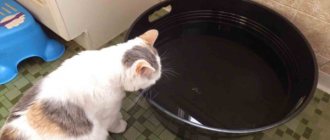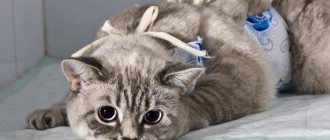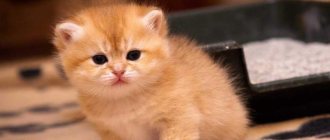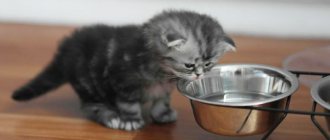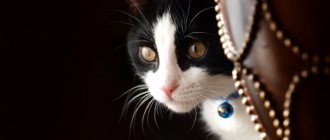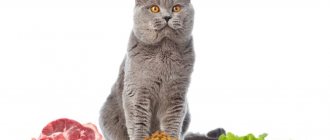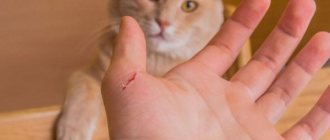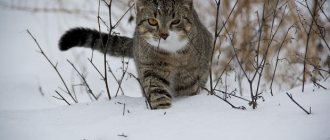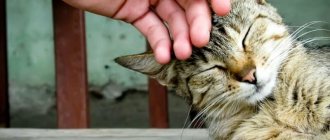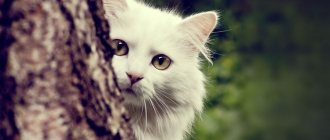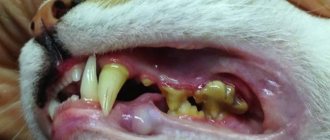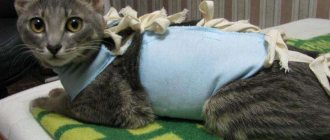Problems with the mucous membrane
This condition is sometimes caused by small particles of food or objects that get stuck in the throat or esophagus. If the particles have sharp edges, then there is a high probability of injury to the mucous membranes, which causes pain and severe discomfort. Naturally, in this state the cat is unlikely to dream about food.
In addition, a foreign body in the stomach or intestines causes difficulty in moving food. Food stagnates and is not digested, and begins to rot. Putrefactive bacteria can lead to acute poisoning, so your pet should be seen by a veterinarian as soon as possible.
Trying to remove the stuck pieces on your own will aggravate the pain and, most likely, will not bring results. The only way to alleviate the condition before the doctor arrives is to drink plenty of cold water.
Anorexia
Catastrophic weight loss in the body can be caused by problems with digestion or the presence of worms in the body. This is especially common in kittens.
The baby's body is still developing, so it is natural that some food is not fully absorbed, creating discomfort in the intestines. For this reason, the baby may refuse food.
What to do? Give neutral food, boiled or well-heated, restorative broths and always fresh water.
If worms have settled in the esophagus, they poison the kitten’s blood with the products of their vital activity. This causes general malaise and weakness, and as a result, loss of appetite and lethargy.
Mandatory measures are to give an anthelmintic in exact accordance with the weight and age of the kitten (for example, Drontal, Milbemax tablets, Profender, Stronghold drops). Next, observe your pet’s urine and stool. Insertion of parasites is easy to distinguish in the urine, and the helminths themselves can be found in the stool. Even if there are no worms in the intestines, precautions will not be unnecessary.
Other reasons why cats refuse to eat and drink
But a cat’s refusal to eat and drink may not always indicate serious health problems.
Sometimes this is simply evidence of stress or an animal showing character. Yes Yes! If you have offended your pet in some way, then not all of them are in the wrong places. Some cats may begin to defiantly refuse food in response to an undeserved insult. In addition, the animal may not eat for several days in such cases as:
- moving to a new place.
Cats get very used to their place of residence, and the need for a change of environment has a depressing effect on them. In this case, you should wait a few days until the pet gets comfortable in its new home; Moving to a new home can be quite stressful for a cat. - sudden change in diet. If the owner decides to switch the animal to natural food or changes the brand of dry food, this may cause a protest in the cat. In this case, you should choose exactly the diet that your pet will like;
- recent vaccinations;
- dirty bowl.
Cats are big clean people, and therefore most of them will not eat from dirty dishes. The owner should keep his pet's bowls perfectly clean; The cat's bowl must be perfectly clean! - beginning of puberty. At this time, a release of hormones occurs in the cat’s body, which affects the animal’s appetite and behavior.
We suggest you familiarize yourself with: Asian Shorthair cat
You can determine whether a cat's refusal to eat is a symptom of illness by its behavior. If your pet is not feeling well, this is manifested not only by a lack of appetite, but also by behavioral changes such as:
- loud alarming meow;
Loud meowing from an animal may indicate the onset of the disease. - anxiety;
- the desire to hide in a dark place, for example, in a closet or under a sofa;
- lethargy, lack of activity;
Lethargy and apathy of the pet should also cause a feeling of anxiety in the owner. - vomit;
- changes in the color and odor of urine and feces.
If an animal exhibits at least a few of these symptoms, it must be shown to a veterinarian.
Gastrointestinal diseases
Problems with the gastrointestinal tract in cats are determined by the following signs:
- vomit;
- diarrhea;
- discharge containing mucus;
- bloating;
- hard and tense stomach;
- strong odor from the mouth.
Among the most common problems is gastritis or the accumulation of hair in the stomach.
It’s not difficult to deal with a hairball: drinking plenty of fluids and special medications that help remove hair from the stomach will solve this problem (for example, “Phytomins”).
But gastritis is somewhat more complicated; its treatment requires time and effort. At the initial stage, it is necessary to give the cat boiled water and rice water. Then they use activated carbon diluted in water and medications prescribed by the doctor (most often these are stomach drops, Almagel). Food should be low-fat and exclusively unsalted.
Common reasons
When a cat has been ignoring food for several days and has lost a lot of weight, the situation can end badly if the factor that influenced the animal’s appetite is not found.
In some cases, refusing to eat may be the only sign of a health problem. It could be:
- viral infection;
- intoxication;
- toothache;
- loss of smell, etc.
Some causes occur rarely, while others affect every second pet. Even a common cold can cause a lot of trouble.
Factors that negatively affect appetite
| Cause | Description |
| Damage to the mucosa | Playful cats often grab various objects in their teeth and may accidentally swallow them. A foreign body sometimes enters the stomach along with poor-quality food. Fish and chicken bones can damage the mucous membrane. Injury causes pain and provokes the development of inflammatory processes (sometimes bleeding) |
| Anorexia | Loss of appetite is common in small animals and is one of the signs of the disease. The reasons may vary from infection to cancer. Most often, anorexia, accompanied by drowsiness, manifests itself in liver diseases |
| Problems with the gastrointestinal tract | Malfunctions in the digestive system can be caused by gastritis, ulcers and other pathologies, due to which the production of bile is disrupted. Another reason is wool accumulated in the stomach. Most often occurs in smooth-haired pets. When licking, the cat swallows hairs that stick to the walls of the stomach and roll into lumps. |
Such problems are difficult to diagnose by visual inspection. A whole range of biochemical and hardware studies will be required.
Therefore, if the cat has become lethargic and refuses to eat, it must be taken to a veterinary clinic.
Liver diseases
Liver problems are difficult to diagnose visually. This is indicated by indirect signs:
- frequent diarrhea;
- change in color of mucous membranes to all shades of yellow;
- yellowing of the skin;
- brownish urine and gray stool;
- conjunctivitis.
The first sign of liver malfunction is jaundice. It is clearly visible to the naked eye - part the hairs on the cat’s body and evaluate the color of the skin. In its normal state it ranges from white to light pink. If yellowing or pronounced yellow spots are noticeable, then rush to the veterinarian.
The diagnosis is made after blood and urine testing. The doctor will prescribe treatment and determine a diet for each specific case.
Main factors for food refusal
As we have already said, refusing food is not always a reason to immediately raise the alarm. So, if she refuses to eat, this does not mean that she is terminally ill. It is quite possible that the animal simply does not want to eat. The fact is that in old animals the metabolism (that is, metabolism) is very slow, as a result of which the need for nutrients is also small.
You need to be wary only if the fast lasts for a very long time, and the cat, in addition to food, also refuses water. All of these could indicate serious problems with and(). This is often indicated by a change in the color of the skin (more precisely, its yellowing), signs (foaming at the mouth), etc. The latter is typical, among other things, for uremia.
Also, the physiological reason for refusing to feed is. When a pregnant cat refuses to eat, she is clearly preparing to become a mother. This is also indicated by her restless behavior, meowing and constant rushing around the house. The animal is looking for the most suitable for the birth of kittens. There's simply no time for food here.
The postoperative period is a very difficult and responsible time. If, for example, after a cat, this is not surprising. It’s just that the pet’s body has not yet recovered from the effects of general anesthesia, the animal is still too weak to absorb food. But it is normal to refuse food only for a couple of days, and the pet should drink normally during this time.
If this situation has been going on for several days and there are no changes, it is better to show the animal to a veterinarian. It is quite possible that we are talking about some dangerous postoperative complication. Digressing a little from the topic: how can you even understand when a cat has decided to voluntarily fast, and there is nothing wrong with that, and when its reluctance to eat is the result of some pathological process?
- Stress.
- Changing your diet.
- Thermoregulation.
- Sexual instinct.
- Pregnancy.
- Postpartum period.
- Consequences of anesthesia.
- Parasites.
- Oral diseases.
- Poisoning.
- Foreign body and fur in the stomach and intestines.
- Viral infection.
- Diseases of the liver, kidneys and urolithiasis.
Stress
Cats are exposed to stress no less, and perhaps even more than people. Moving to a new place of residence, a new bowl, rearranging the room, renovations, a business trip for the owner, or mood swings of the owner - all these are stressful situations for the animal.
Even the arrival of guests or a quarrel between family members can affect the cat’s well-being.
During stress, the cat is not active, she has an apathetic mood, she does not want to play with the owner, she eats poorly or refuses to eat at all. In such a situation, there is no need to force the animal to eat; refusing food for a couple of days is the norm.
Increased attention to the cat from family members, affectionate treatment, and new toys help in stressful situations. In severe cases, consultation with a veterinarian is necessary, who can prescribe sedatives to the animal.
But be careful: the cause of stress may be the onset of an illness.
Changing your diet
New food is stressful in itself. Cats are very picky eaters and are sensitive to any change in diet. A sudden transition from one type of food to another, or a change in the brand of dry or wet food, can lead to the animal going on a hunger strike.
We invite you to read: Maxidin for cats and dogs: instructions for use
The animal does not understand that the new food is of better quality and cannot appreciate the efforts of the owner. The cat is accustomed to a certain food, so it declares a “boycott” on any unfamiliar food.
Monitor the condition of the animal; if the cat looks healthy and drinks enough water, then you should not worry too much about such a “hunger strike”.
But to prevent this from happening, the transition to a new food must be done gradually, adding it in small portions to the usual food.
Read the rating of dry food for kittens.
Thermoregulation
In simple words, the animal is hot and does not want to eat. This happens in summer in hot weather or in winter in apartments with central heating. Your pet is lethargic, lies down all the time, doesn’t want to do anything, eats poorly, but drinks a lot.
In unbearable heat, a cat may not eat from a day to three, and in between, eat small portions. This is normal because the more your cat eats, the more heat her body will produce while digesting the food and it will be more difficult for her to cope with the heat.
The owner need not worry. The main thing is that the cat always has enough fresh water.
Dangerous tick bite
Meeting with a tick is especially dangerous for cats that have access to free walks on the street. Parasites waiting in the grass can attach themselves to the cat’s body while relaxing in the fresh air.
If you notice that your pet categorically refuses to eat for several days, this may mean that the tick is drinking juices and is the cause of her weakness.
Inspect high-risk areas - tender abdomen, armpits, areas behind the ears. These are the warmest and most defenseless places where ticks often cling. If you find a swollen parasite, try to consult a doctor who will provide qualified assistance.
It is advisable to analyze the removed tick for health risks. After this, the doctor will prescribe the necessary treatment.
How long can a cat go without eating, what are the dangers of starvation?
The aroma of food is extremely important to your pet.
In most cases, it is enough to lure a “capricious” cat with the smell of something really tasty to awaken his appetite. Cats are especially impressed by the aroma of meat and fish, while others “peck” at the smell of smoked meats. In a word, everything here is individual, and a good breeder always knows what exactly his pet loves most. Occasionally there are cats whose appetite can be helped by... moving them to an unusual place. Sometimes replacing the bowl with another one works. Finally, the biorhythm of a particular animal also matters. Some cats eat best in the morning, others in the evening, and others are happy to eat anything, but only after the owner returns from work.
Let's summarize. If a cat refuses to eat and drink, then this is a 100% sign of some serious problems with its health. What to do? Of course, take her to the vet immediately. If the animal behaves quite adequately and drinks a normal amount of water, then, most likely, there is nothing to worry about - a voluntary short-term hunger strike will not harm your pet in any way.
Unfortunately, our furry pets cannot tell their owners that something is bothering them at the moment. But they give nonverbal signals about health problems, which an attentive and sensitive owner should recognize in time. One of the most obvious symptoms of health problems in a cat can be a prolonged refusal to eat and drink.
Severe weight loss is very dangerous for a cat.
Even if a long-term refusal to eat food is not associated with a serious cat illness, it can lead to unpleasant consequences for its health. Of these, first of all it should be noted:
- Exacerbation of a chronic disease. If the pet also has other organs, then fasting for a day or more can provoke an attack;
- severe weight loss;
- lack of vitamins, which can affect the overall well-being of the animal.
Particular attention should be paid to the nutrition of a small kitten up to six months old. If adult animals can easily go without food for two days or more, then the baby can die within a day after fasting. Therefore, if a kitten refuses to eat, the owners need to feed it themselves, pouring milk into the mouth from a pipette.
There are many reasons why a cat does not eat or drink and only sleeps. Very often, an animal refuses food and water when pathological changes occur in the body. The cat loses its appetite, becomes lethargic, constantly wants to sleep if it has diseases of the digestive tract or other vital organs. Refusal to eat is a response to pain.
If your cat is lethargic for several days and does not want to drink, this may indicate the onset of the first heat.
The animal simply experiences fear and excitement when faced with a new period in life. Physical changes occurring in the cat's body lead her to confusion, which you may mistake for an illness. Usually this condition goes away after a few days, and the animal returns to its normal life.
A cat may refuse to eat or drink if it has a helminthic infestation in its body. To ensure that your pet always has a good appetite, periodically give him preventive treatment for a parasitic infection.
- Exacerbation of a chronic disease. If your pet has chronic diseases of the kidneys and other organs, then fasting for a day or more can provoke an attack;
- severe weight loss;
- lack of vitamins, which can affect the overall well-being of the animal.
If a cat refuses to eat, there can be many reasons - the onset of the disease, psychological, childbirth and the postpartum period, age, etc. We will try to talk about the most common of them. The main reasons associated with the animal’s health include:
- Presence of worms. There is an opinion that in the presence of parasites, the pet’s appetite increases. This is a misconception - histamines are the source of many infections that can cause permanent loss of appetite.
- Gastrointestinal diseases. These include ulcers, indigestion, and gastritis. They are manifested not only by refusal of food, but are also accompanied by an unpleasant odor from the mouth and diarrhea.
- Diseases of the circulatory system.
- Diseases of internal organs - gastrointestinal tract, liver, genitourinary and reproductive systems, oncological diseases. It is especially dangerous when the cat, in addition to food, also refuses water. This may indicate serious kidney and liver problems (CKD). This is also indicated by changes (more precisely, yellowing) of the skin, signs of intoxication - often foam appears at the mouth. If you notice these signs in your pet, go to the veterinary clinic immediately.
- Bacterial or viral infections cause apathy, diarrhea, vomiting, and fever.
- Food poisoning, intoxication with chemicals, potent poisons. In these cases, the prognosis depends on the substance that provoked the pathology. Often, cats’ instinct tells them how to treat themselves, where to find the herb needed for healing. But in case of severe poisoning by toxic substances, it is not always possible to save the animal even with medications.
If you suspect your pet has a disease, do not try to help the cat yourself; you will only waste precious time.
A healthy adult cat can fast without health problems for up to 5 days, an aging animal - no more than three, a kitten - a maximum of a day, an animal with a chronic disease - no more than two days.
These are approximate dates, taking into account that the animal drinks enough these days. Longer fasting or fasting while refusing to drink is dangerous for the life of a pet.
We suggest you read: Cairn Terrier breed description – Drugdoma
A kitten under 6 months of age can die within 24 hours of fasting, so if the kitten does not eat, it must be force-fed.
In addition to the risk of death, refusing to eat can cause the following health problems:
- severe weight loss;
- exacerbation of any chronic diseases;
- avitaminosis.
The most terrible reason that takes away a pet's desire to eat is rabies, an extremely dangerous infectious disease that, without a course of anti-rabies serum, is fatal to humans and animals.
There are three forms of rabies, each of which is accompanied by loss of appetite.
The first, depressive stage, may not be noticed, since the infected cat becomes too affectionate and tries to lick the owner’s hand, which is very dangerous, since the saliva already contains the pathogen and is contagious, despite the absence of characteristic symptoms.
At the second stage, the cat not only refuses food, it develops hydrophobia (fear of water). The animal behaves inappropriately, chews furniture, carpets, swallows various objects, scratches and bites people, even members of the family in which it lives.
It is impossible to diagnose rabies until the cat dies; the disease cannot be treated, therefore, at the slightest suspicion of infection, the animal is euthanized and an autopsy is performed to make a diagnosis.
Symptoms that are characteristic of rabies are observed in the second or third stage of the disease. The cat is afraid of light and water, saliva flows from its drooping lower jaw, and aggression appears, directed at both people and animals.
Animals are not treated for rabies; only preventive vaccinations can serve as protection.
Refusal to eat does not always indicate poor health of the cat. Attentive owners know their animal well, its habits and character traits; it will not be difficult for them to determine how serious the situation is. But there are times when even experienced cat owners get lost when faced with incomprehensible behavior of their pet. Knowing what factors influence a cat’s appetite, you can control any situation and not give in to panic if the animal refuses to eat.
Diseases of the circulatory system
Blood diseases are more common in older cats. A diagnosis can only be made based on laboratory blood tests. To do this, they study the composition of red blood cells and the level of hemoglobin. The cause of the disease may be disturbances in the functioning of the hematopoietic organs.
During the treatment, general strengthening and supportive medications (Radostin, Sanal Senior Lecithin), as well as foods high in iron, are prescribed. It is necessary to provide care and note changes in the condition of the sick cat.
Diabetes
Cats, like people, have elevated blood sugar levels. This does not occur too often, but such a disease requires increased attention and timely treatment.
Reasons: monotonous, poor nutrition and lack of exercise. Diabetes most often affects animals whose activity is limited to the walls of a city apartment. You should watch neutered cats especially carefully - their pancreas function is often impaired due to excess weight.
Treatment of diabetes is a very complex and painstaking process, so not all owners are ready for it. Some prefer not to torture the animal, but to euthanize it.
If the diagnosis is confirmed by a specialist, then long-term treatment begins. It includes insulin injections and a special diet. You constantly need to measure your sugar level (about once every 2-3 hours). So the doctor prescribes an individual dosage and course of therapy.
If the measures prescribed by the doctor are followed, the cat can fully recover and live a long, fulfilling life.
What should you do if your cat doesn’t eat anything and only drinks water?
A cat who has stopped eating should be monitored. The algorithm of action for a cat owner is based on identifying additional symptoms and eliminating the causes independently or with the help of a veterinary specialist.
Responsible owners keep a diary and write down everything that happens. When collecting anamnesis, such information helps to establish an accurate diagnosis and prescribe the correct treatment.
If the cat does not eat, only drinks water, lethargic
When food refusal occurs due to a sudden change in food, you should wash the bowl well. A clean person will not eat from a dirty one. You should give preference to a ceramic bowl. It does not rattle, does not absorb food odors, and is easy to clean. Sometimes the food is not suitable for the cat.
This happens even with high quality products. Therefore, it is necessary to introduce new ready-made food or natural feeding ingredients gradually, over the course of a week. At the same time, they monitor their behavior and appearance to see if signs of an allergy to food have appeared.
If the day before the hostess treated the purr to meat trimmings or fish, and he ate too much, you need to watch him. If no pathological symptoms appear, it is best to wait: a short fast will be beneficial. In hot weather, turn on the air conditioning, but avoid drafts.
If the cat does not eat, does not drink and burps
When licking, cats, especially long-haired ones, swallow hairs that become clumps. The animal stops eating, drinking, coughing, and tries to get rid of bezoars by vomiting. To prevent the formation of hairballs, use Malt paste or special food for long-haired cats. In some situations, in this way the animal manages to get rid of a foreign object that has entered the nutritional or respiratory tract.
Pregnant cats, like women, may have toxicosis accompanied by vomiting.
Be sure to read:
Why does a cat bleed from under its tail: is it flowing or dripping, what should the owner do, should he be worried?
Pathological vomiting occurs with high levels of intestinal infestation. Helminths irritate the bronchial or gastric mucosa and cause regurgitation (reverse peristaltic contractions).
If an animal is constantly vomiting, it stops drinking and eating. Such symptoms are typical for viral infections. Vomiting, accompanied by salivation and diarrhea with blood, indicates feed poisoning, especially when eating sleepy mice during periods of mass deratization.
If the cat does not eat or drink, the nose is dry
A short-term combination of a dry nose with lethargy and lack of appetite is not a cause for concern. But when nasal or conjunctival discharge is added, you should run to the clinic. There is a high probability of viral infection.
If the nose is hot, the disease is in full swing. The combination of dryness and low temperature is an alarming symptom. If there is inadequate or no treatment, the animal will die.
The oral cavity is injured
A cat can get injured during a fight; eating in this case causes severe pain and is of no benefit.
Also, the causes may be toothaches, stomatitis, various types of ulcers and cuts.
Treatment of the oral cavity at home should only be carried out with the prescription of a veterinarian. It is not allowed to cauterize damaged areas with iodine, brilliant green, or alcohol. It is also not worth applying any creams to the affected areas - this can spread the infection into the blood.
Consult your doctor and provide all possible assistance to your beloved cat.
Why doesn't the kitten eat?
There are many factors that influence the appetite of a small kitten. The main ones:
Stressful state
When a baby comes to a new home from a nursery, he is always torn away from his mother, his nest. He lacks the usual affection and attention, often he does not know how to take care of himself. Sometimes the move is accompanied by a complete refusal to eat and drink; the kitten may not go to the toilet even once for two days.
This condition is very dangerous, since against the background of stress, rapid dehydration and intoxication of a young body with insufficient immune defense occurs. During this period, it is important to show increased attention to the pet, surround it with love and protection, pick it up more often, and play. Offer a treat with an appetizing smell and create a comfortable environment.
New food regime
In the nursery, the baby, even receiving additional nutrition in the form of specialized formulas, still suckled on his mother. The loss of mother's milk in the diet is a shock for the kitten, both in terms of the nutritional component and psychologically.
Early weaning
Is food stress. The kitten simply does not know how to eat other food. In this case, it must be fed with cat milk substitutes, which are sold in veterinary pharmacies, or with goat milk.
Dishes
The baby refuses food because of an unusual bowl that is too bright or a plastic plate with a strong smell.
Spoiled food
Spoiled food particles also cause poor appetite.
Worm infestation and parasites
In a kitten, it is often a factor in poor appetite or complete aversion to food. The baby is losing weight, the condition of the coat is deteriorating, drooling, vomiting, and diarrhea appear. Deworming is necessary or, if the animal’s condition is of concern, observation by a veterinarian. External parasites can provoke similar factors.
Virus or other infection
The kitten refuses to eat due to inflammatory diseases of an infectious nature. The baby should be saved immediately; the pet can quickly die.
Other situations
Problems with the reproductive system
Animals have great difficulty undergoing the rehabilitation period after castration or sterilization. More often than not, they simply hide in a distant dark corner and lick their wounds there. There is no need to disturb them in this state.
All that is required is to place the litter tray close and provide fresh drinking water.
The same rules can be applied to the period of the first heat in a young cat.
Stress
In the lives of our tailed friends, there are also difficult days, and even prolonged depression.
It can be provoked by:
- moving;
- parting with a beloved owner;
- separation of kittens from their mother (in this case it will be difficult for both the kittens and the cat itself).
If you notice that your cat is sad all the time, shows no energy and mostly sleeps, then you need to let her come to her senses. For a day or two, she may well arrange a fasting day for herself.
If food intake does not begin on both the third and fourth days, you should be concerned about the animal’s condition and start feeding it, at least through force.
How to help your pet?
Apart from psychological problems, refusal of food in animals means that the normal life cycle is disrupted and urgent veterinary intervention is required to determine the cause and treatment. Since there are only two reasons for cats refusing food: an infectious disease and an upset stomach, it is necessary to find out what exactly is bothering the pet.
The reluctance to eat a favorite food in a healthy cat can last a little more than an hour after the next meal. Then she is ready to eat again if offered. So, if a cat refuses to eat, lies down, and looks lethargic, what should you do?
Take your temperature. To do this, you can use a thermometer placed in the anus. The procedure is unpleasant, but it must be carried out and try to keep the animal from running away. The normal temperature for cats is 38 °C. Its increase indicates the presence of infection, and its decrease indicates a decrease in vitality due to lack of food and water. However, a normal temperature does not always mean that your pet is healthy, but in this case the likelihood of inflammation is sharply reduced.
Vomiting in a cat - poisoning and more
In addition to the first version that comes to mind, that the cat was poisoned, there are a number of other reasons for the malaise.
The most important thing to note is severe overeating. If an animal has been hungry for a long time and then eats a lot, the stomach does not have time to cope with the load. Excess food is eliminated naturally.
Animals can independently regulate vomiting processes, relieving themselves of the feeling of heaviness and discomfort in the abdomen.
If the food was eaten too quickly, it is possible that the walls of the esophagus were strongly irritated by something, which also led to vomiting.
Be sure to monitor your pet's diet. Feeding foods that are difficult and take a long time to digest creates additional problems with the gastrointestinal tract. If you feed your cat dry food, it may be worth switching to a different one.
Recommendations for improving the condition:
- Analyze what the animal has eaten recently. Perhaps the condition was affected by a new product or food that had not been introduced into food before.
- For constipation combined with vomiting, give an enema. Toxins accumulated in the body will be eliminated faster.
- Cats with long, thick hair require thorough brushing every day. It is very likely that the cause is wool stuck in the stomach.
If he doesn't eat, doesn't drink and burps
If you notice these signs in your pet, they can be explained by the following factors:
- The cat ate the food too quickly.
- You put too much food in your lunch and your pet ate it all.
- You have given your cat food that is too dense and difficult to digest.
- You switched your pet to a new food without prior preparation.
- The food turned out to be of poor quality and had spoiled.
- It is possible that the cause of the lack of appetite is poisoning due to the cat rummaging through the trash or eating something poisonous.
Try changing the food and see if your pet still refuses to eat.
Health problems
This condition may also be associated with certain health problems. The most common are the following:
- digestive system cancer;
- renal failure of the body;
- diabetes;
- presence of infection in the stomach;
- the presence of parasites in the esophagus.
If your cat has one of the first four diseases, then you should never treat it yourself. Here you need to act differently and at the first sign, immediately show him to the veterinarian. Any other action may endanger the cat's life. increase the chances of saving and speedy recovery of the animal if a diagnosis is made in a timely manner and treatment is started. And attempts to help a cat at home can lead to the animal dying due to your experiments.
If you suspect that there are worms in your cat’s stomach, you can find out for yourself whether this is true or not without contacting a specialist. There's nothing complicated about it. To do this, you will need to purchase an anthelmintic for domestic cats at the veterinary store. It is added to water or food. But for it to work well, it is recommended to give it to the cat in its pure form.
Of course, the animal will not want to eat the medicine so easily and will break out. To do this, you will have to open your mouth with one hand and place the tablet under your tongue with the other. Make sure your cat swallows the medicine , otherwise you won't achieve anything. After your cat eats the drug, you should wait until she wants to go to the toilet.
When the cat relieves itself, you need to analyze the excrement visually. The presence of parasites in feces means that they are also contained in the animal’s body. If you were unable to detect them, then you should show the cat to a doctor.
How can you help if the cat doesn’t eat or drink anything, but only sleeps?
In a situation where the animal does not eat anything, but at least drinks, it is easier to understand. This is how the tailed animals regulate their well-being themselves, and their appetite returns over time.
What to do if you also refuse water? What to do if the cat sleeps all the time and does not react to the presence of the owner? This is a very dangerous condition, especially if the cat is very young or, conversely, old.
A small kitten does not yet have enough strength to cope with all illnesses, and in the body of an old cat, the protective resources are already depleted.
Therefore, if you are completely apathetic and refuse to eat or drink, immediately contact your veterinarian. If after two days the cat does not at least start drinking, feel free to consult a doctor. Qualified help can save the life and maintain the health of your pet!
The cat does not eat, sleep and only drinks water: 5 reasons
In the wild, days of successful hunting alternate with failures. Therefore, cats often go hungry. For pets the situation is different. However, a young animal can undergo a five-day starvation diet without harm to its health, provided it has free access to water. For older cats, the critical point occurs after 3 days.
Animals suffering from chronic pathologies cannot go without food for two days. The kitten should not remain hungry for more than 24 hours.
If fasting continues for more than the specified period, lipidosis develops. The body mobilizes fat reserves that rush to the liver, causing its degeneration. The pathological condition often ends in death.
As for the drowsy state, it is typical for cats. The animal accumulates strength from 12 to 20 hours a day in order to waste energy in short moments of vigorous activity. Before going to bed and for some time after waking up, the cat looks lethargic.
There are 5 main reasons for refusing to eat:
- Change of environment, change of diet. Cats are emotional animals. Adaptation to a new place, the appearance of a new pet in the house, and the abundance of other cats at the exhibition distract from food. A change in diet can cause fattening failure. The cat does not like the taste, smell, appearance, consistency, or new dishes.
- The need to cleanse the intestines. In the wild, hunting luck doesn't shine every day. Therefore, the cat tries to eat for future use. Excess food requires drowsiness, decreased activity, and short-term fasting. Another need for cleaning is to expel from their intestines lumps of hair swallowed by licking.
- Sexual heat, pregnancy, lambing. The process of procreation is a more important problem than hunger.
- Heat. Cats do not have sweat glands. The cooling mechanism through the open mouth and protruding tongue is not expressed. Therefore, the animal protects itself from overheating by stopping calorie intake and reducing activity.
- Pathology . In this case, depression and anorexia are accompanied by additional symptoms - fever, digestive disorders, cough, pain reactions, stomatitis, and oral ulcers.
Be sure to read:
The cat does not drink water: reasons, daily intake, what to do, is it dangerous, how to force the animal to drink
